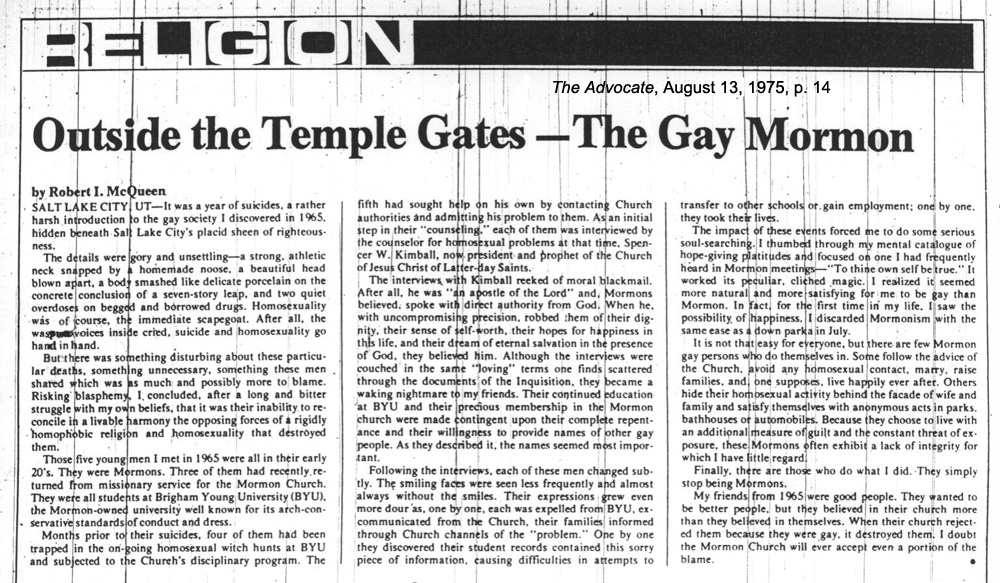Robert I. McQueen writes about 5 gay men that he knew that committed suicide at BYU in 1965.
- Type
- Periodical
- Source
- Robert I. McQueen LDSResignedCritic
- Hearsay
- DirectJournalism
- Reference
Robert I. McQueen, "Outside the Temple Gates —The Gay Mormon," The Advocate, August 13, 1975, 14
- Scribe/Publisher
- The Advocate
- People
- Robert I. McQueen
- Audience
- Reading Public
- Transcription
Outside the Temple Gates - The Gay Mormon
by Robert I. McQueen
SALT LAKE CITY, UT - It was a year of suicides, a rather harsh introduction to the gay society I discovered in 1965. hidden beneath Salt Lake City's placid sheen of righteousness.
The details were gory and unsettling - a strong, athletic neck snapped by a homemade noose, a beautiful head blown apart, a body smashed like delicate porcelain on the concrete conclusion of a seven-story leap, and two quiet overdoses on begged and borrowed drugs. Homosexuality was of course, the immediate scapegoat. After all, the ws [unclear] voices inside cried, suicide and homosexuality go hand in hand.
But there was something disturbing about these particular deaths, something unnecessary, something these men shared which was as much and possibly more to blame. Risking blasphemy, I concluded, after a long and bitter struggle with my own beliefs, that it was their inability to reconcile in a livable harmony the opposing forces of a rigidly homophobic religion and homosexuality that destroyed them.
Those five young men I met in 1965 were all in their early 20's. They were Mormons. Three of them had recently returned from missionary service for the Mormon Church. They were all students at Brigham Young University (BYU), the Mormon-owned university well known for its arch-conservatives standards of conduct and dress.
Months prior to their suicides, four of them had been trapped in the on-going homosexual witch hunts at BYU and subjected to the Church's disciplinary program. The fifth had sough help o his own by contacting Church authorities and admitting his problem to them. As an initial step in their "counseling" each of them was interviewed the counselor for homosexual problems at that time, Spencer W. Kimball, now president and prophet of the Church of Jesus Christ of Latter-day Saints.
The interviews with Kimball reeked of moral blackmail. After all, he was "an apostle of the Lord" and Mormons believed, spoke with direct authority from God. When he, with uncompromising precision, robbed them of their dignity, there sense of self-worth, their hopes for happiness in this life, and their dream of eternal salvation in in the presence of God, they believed. Although the interviews were couched in the same "loving" terms one finds scattered through the documents of the Inquisition, they became a waking nightmare to my friends. Their continued education at BYU and their precious membership in the Mormon church were made contingent upon their complete repentance and their willingness to provide names of other gay people. As they described it, the names seemed most important.
Following the interview, each of these men changed subtly. The smiling faces were seen less frequently and almost always without the smiles. Their expressions grew even more dour as, one by one, each was expelled from BYU, excommunicated from the Church, their families informed through Church channels of the "problem." One by one they discovered their student records contained this sorry piece of information, causing difficulties in attempts to transfer to other schools or gain employment one by one they took their lives.
The impact of these events forced me to do some serious soul-searching. I thumbed through my mental catalogue of hope-giving platitudes and focused on one I had frequently heard in Mormon meetings - "To thine own self be true." It worked its peculiar, cliched magic. I realized it seemed more natural and more satisfying for me to gay than Mormon. In fact, for the first time in my life, I saw the possibility of happiness. I discarded Mormonism with the same ease as a down parka in July.
It is not that easy for everyone, but there are few Mormon gay persons who do themselves in. Some follow the advice of the Church, avoid any homosexual contact, marry, raise families, and one supposes, live happily ever after. Other hide their homosexual activity behind the facade of wife and family and satisfy themselves with anonymous acts in parks, bathhouses or automobiles. Because they choose to live with an additional measure of guilt and the constant thread of exposure, these Mormons often exhibit a lack of integrity for which I have little regard.
Finally, there are those who do what I did. They simply stop being Mormons.
My friends from 1965 were good people. They wanted to be better people, but they believed in their church more than they believed in themselves. When there church rejected them because they were gay it destroyed them. I doubt the Mormon Church will ever accept even a portion of the blame.
- Source Link
- https://web.archive.org/web/20210211070322/www.connellodonovan.com/images/templegates.jpg
- Citations in Mormonr Qnas
The B. H. Roberts Foundation is not owned by, operated by, or affiliated with the Church of Jesus Christ of Latter-day Saints.

